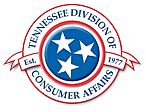 Nashville, TN – Robocalls are computer-generated recorded messages used to communicate with the masses via telephone. A favorite of telemarketers, robocall technology is also used by thieves and scam artists to lure residents into traps.
Nashville, TN – Robocalls are computer-generated recorded messages used to communicate with the masses via telephone. A favorite of telemarketers, robocall technology is also used by thieves and scam artists to lure residents into traps.
“When I’m speaking to groups across the state, audience members inevitably ask about robocalls,” said Director Gary Cordell of the Tennessee Division of Consumer Affairs. “I always tell them that if you pick up the phone and a recorded voice tries to sell you something – hang up immediately!”
Robocalls are generated by an auto dialer that can place thousands of calls per minute. The Federal Communications Commission has seen robocall complaints double from 2010 to 2012. The Federal Trade Commission (FTC) is getting 200,000 robocall complaints per month and has issued $215 million in fines against those responsible.Complaints about robocalls include individuals who found their credit cards billed for things they thought were free and individuals who found themselves suckered into costly debt-reduction scams or overpriced, loophole-ridden auto warranties.
Cordell offers Tennesseans the following tips for handling robocalls:
- If you get a robocall from a telemarketer, hang up.
- Don’t press one — the option that connects you to a live person, who may try to sell you a scam.
- Don’t press two — the option that’s supposed to take you off their calling list. You may get more robocalls if you confirm that a human being answers your number.
- Never give personal information through a robocall.
- Never give your credit card or banking information to anyone at the end of a robocall.
- If you’re receiving harassing robocalls call your local authorities and the Division of Consumer Affairs at 615.741.4737.
Many report that even though they are on the Federal and State “Do Not Call” register’s calls still come through. Federal regulations prohibit such calls unless the caller has specifically agreed in advance to receive them — with exceptions for political messages, school-closing messages and other groups, including debt collection.
State and federal laws prohibit commercial sales calls to people on do-not-call lists, therefore it is important that consumers be wary of any computerized call, especially one that promises a great deal!
About the Tennessee Consumer Affairs Division
Consumer Affairs is a division of the Department of Commerce and Insurance, which works to protect consumers while ensuring fair competition for industries and professionals who do business in Tennessee. Follow us on Facebook, Twitter, and Youtube for all the latest TDCI news!


